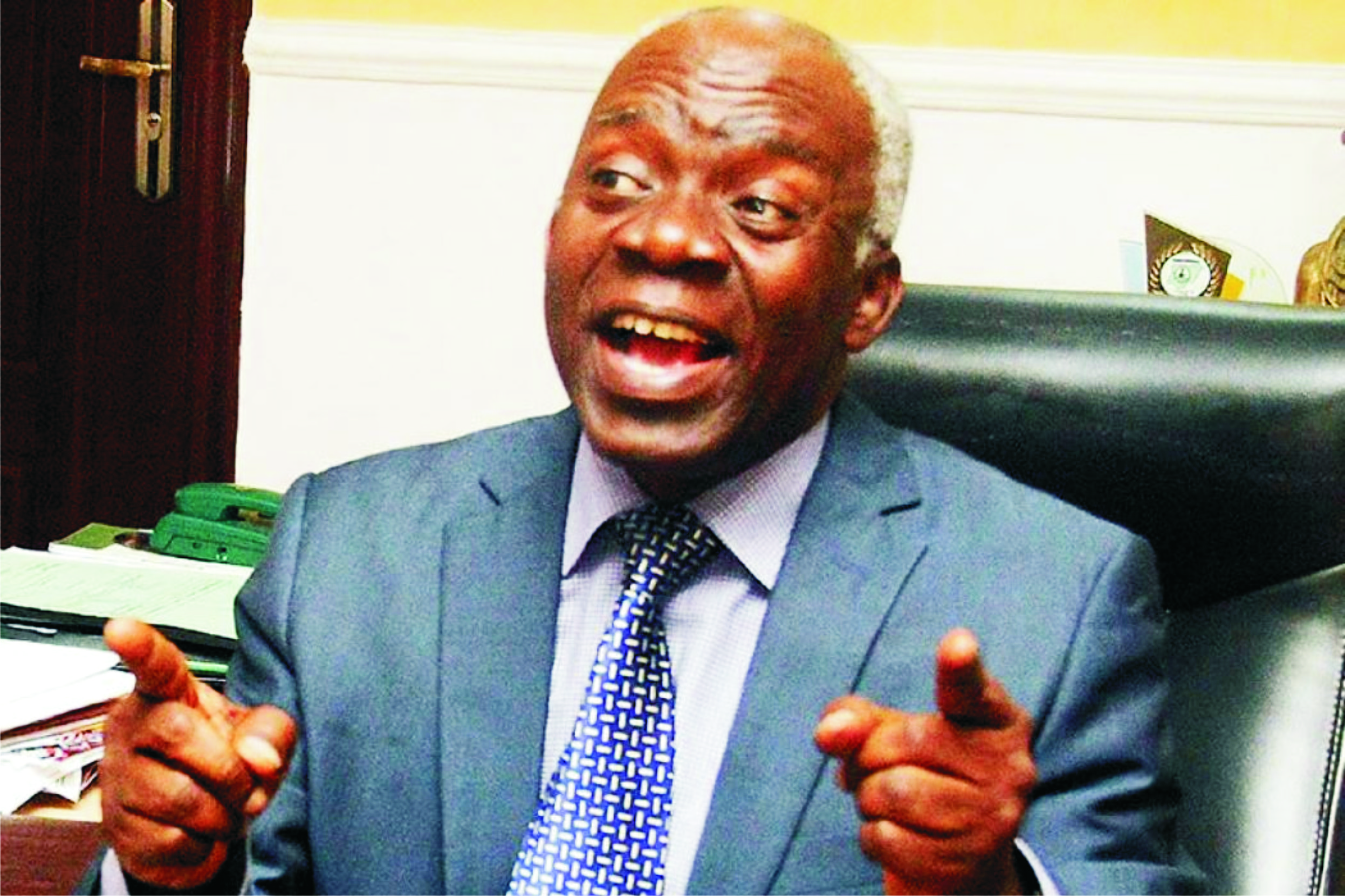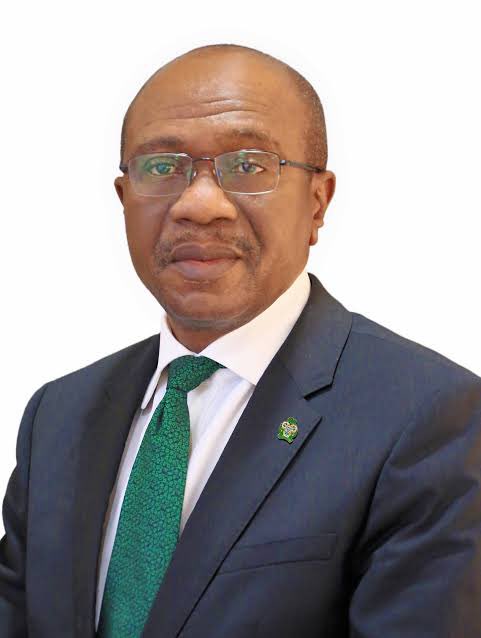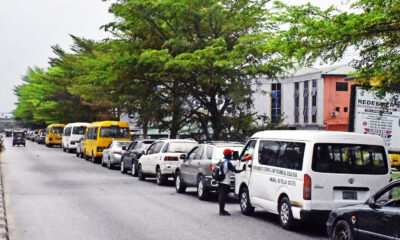News
SERAP, Pensioners Drag Buhari To ECOWAS Court
The Socio-Economic Rights and Accountability Project (SERAP) and several pensioners’ associations have asked the ECOWAS Court of Justice in Abuja to order the Federal Government led by President Muhammadu Buhari to deduct the pensions, salaries and gratuities of pensioners and workers across several states of Nigeria from the statutory allocations of the indebted state governments.
They also want President Muhammadu Buhari to order the payment of same directly to the pensioners and workers on a-monthly basis.
In the suit marked number ECW/CCJ/APP/39/2017, the plaintiffs are suing over violations of the human rights of workers and pensioners to equality and equal treatment.
They want immediate payment of all outstanding pensions, salaries and gratuities through deductions from statutory allocations of the indebted state governments, and payment of adequate monetary compensation of N50 million to each of the pensioners and workers.
Other plaintiffs joining SERAP in the suit are First Bank of Nigeria Pensioners (Lagos); Mrs Comfort C. Owoha, Joseph Agabi; Osemwenkha G.O and Mrs J.E. Enabunlele. The plaintiffs are suing for themselves and on behalf of their members and other workers and pensioners across the country whose salaries and pensions have not been paid by the states and Federal Government for several months.
In the suit filed on their behalf by Solicitor to SERAP, Femi Falana, the plaintiffs argued that the retirement system in Nigeria violated the right to equal protection of the law and dignity since senior public officials continue to receive “privileged pensions”, salaries and gratuities while the 2nd—7th plaintiffs, their members and several other Nigerian pensioners and workers continue to be denied their entitlements, salaries and gratuities.
They also argued that, “Under international law, Nigeria cannot invoke the provisions of its internal laws or the nature of its federation as justification for its failure to perform a treaty obligation. A fundamental rule of the law of State responsibility is that a State cannot escape its responsibility on the international plane by referring to its domestic legal situation.”
The suit read in part: “Ultimately, the Federal Government cannot escape its responsibility to achieve the effective realization of the rights of Nigerian workers and pensioners to timely and regular payment of salaries, entitlements and gratuities, as it retains ultimate responsibility to ensure the rights of workers and pensioners are fully realized.”
“Workers and pensioners in several states in Nigeria have been victims of violations of civil and political rights and even more severely, of economic, social, and cultural rights. The 2nd-7th plaintiffs and their members and other Nigerian pensioners and workers have experienced extreme poverty, discrimination, social exclusion, stigmatization, and deprivation of protections and entitlements on an ongoing basis due primarily to the failure and/or negligence of the Federal Government to ensure that several states of Nigeria pay accrued pensions, salaries and gratuities.
“By granting the reliefs sought, the ECOWAS Court would be recognizing and reiterating the need for the government and its federating units to protect the rights and interests of the vulnerable, disadvantaged, and marginalized groups.
“Despite their obligations to protecting the human rights of vulnerable, disadvantaged and marginalized individuals and groups, the government has failed to prevent the systematic violation by several states of the federation of a wide range of human rights as a result of the continuing failure and/or negligence to ensure that the states timely and regularly pay workers’ salaries and pensioners’ entitlements and gratuities.
“The government has failed and/or neglected to ensure the timely payment of over 42 months of outstanding pensions and gratuities in Edo State of Nigeria despite Edo State receiving funds in the form of over N29 billion Paris Club refunds between November 2016 and July 2017 from the government.
“The government has since 2013 failed and/or neglected to ensure payment of accrued pensions and gratuities to about 4000 members of the Association of Retired Local Government Staff and Primary School Teachers in Delta State across 25 Local Government Councils of the State, leaving the pensioners to live in extreme poverty.
“Mrs Comfort C. Owoha served for 35 years as staff of the Sokoto State Primary School Board. But payment of her pensions expected to commence in 2001 after verification was inexplicably stopped by the Sokoto State Government.
“The government has failed to exercise due diligence, leading to the refusal and failure of the First Bank of Nigeria PLC to pay its pensioners accrued entitlements and gratuities and when pensions and gratuities are paid the Bank pay as low as N11,000, 13,000 as pensions despite the enormous amount in the Banks’s pension fund.
“The government has since December 2014 failed and/or neglected to ensure that Osun State of Nigeria remits monthly pensions deducted from the contributory pensioners. The government has also failed and/or neglected to ensure regular and timely payment of pensions and gratuities in Osun State, and that contributory pensioners have not been paid since January 2015.
“The government has failed and/or neglected to pay members of the Federal Civil Service Pensioners Association of Nigeria accrued pensions. The government continues to engage the Nigeria Union of Pensioners while deliberately sidelining the Federal Civil Service Pensioners Association of Nigeria and its members. The government is failing and/or refusing to ensure payment by several states of Nigeria of workers’ salaries and pensioners’ entitlements, amounting to billions of Naira in arrears.
“International human rights treaties to which Nigeria is a state party impose obligations on the government to ensure that economic difficulties and times of severe resource constraints cannot be used to undermine the enjoyment of the human rights of workers and pensioners in Nigeria, and disproportionately hurt them.
“The right to timely and regular payment of pensions and salaries is essential, particularly when a person does not have the necessary property available, or is not able to secure an adequate standard of living through old age or economic and social factors.
“According to the Nigeria Union of Local Government Employees (NULGE), 23 states of the federation currently owed workers arrears of salaries ranging from one to 24 months. NULGE gave the breakdown of states as follows: Bayelsa State: 10 to 16 months; Kogi State: between seven to 15 months; Delta State: eight to 14 months; Kaduna State:12 months; Oyo State: three to 11 months; and Edo State: 10 months.
“Others are Abia State: five to nine months; Kwara State: two to nine months; Benue State: nine months; Nasarawa State: seven months; Ondo, Ekiti, Imo States: six months; while Zamfara State has not implemented minimum wage. Adamawa, Rivers, Akwa Ibom, Ebonyi, Plateau States are owing four months; Taraba and Federal Capital Territory: three months while Osun state has been paying half salaries for 24 months; and staff are owed few months in Enugu State.”
“A declaration that the continuing failure and/or negligence of the Defendant to promote and ensure timely and regular payment by several states of Nigeria of pensioners’ entitlements and workers’ salaries and gratuities cannot be justified under any circumstances.
“A declaration that the failure and/or negligence of the Defendant to provide an environment necessary for securing and promoting the enjoyment of the human rights of pensioners and workers at the federal level and in several states of Nigeria to equality and equal treatment; equal protection of the law and non-discrimination; to dignity and independence; is unlawful.
“A declaration that the failure of the Defendant to promote and ensure an effective remedy and reparation for pensioners and workers who have continued to suffer due to the non-payment of pensions, salaries and gratuities by several states of Nigeria is unlawful.
“A declaration that the refusal of the Defendant to ensure the payment of pensions, salaries, and gratuities of the Plaintiffs is illegal and unlawful.
“An order directing the Defendant to respect, protect, promote, and fulfil the human rights of pensioners and workers to timely and regular payment of pensions, salaries and gratuities and therefore, to equality and equal treatment; equal protection of the law and non-discrimination; to dignity and independence; to the respect of the dignity inherent in a human being; to adequate standard of living and well-being; to property; to work; to family life; and to economic and social development.
“An order directing the Defendant and/or its agents to provide effective remedies and reparation, including adequate compensation, restitution, satisfaction or guarantees of non-repetition that the Honourable Court may deem fit to grant to pensioners and workers that have continued to suffer due to the failure and/or refusal by the Defendant to promote and ensure payment by several states of Nigeria of pensioners’ entitlements and workers’ salaries and gratuities.”
News
You Failed Nigerians, Falana Slams Power Minister

Human rights lawyer, Femi Falana, SAN, has passed a vote of ‘no confidence’ in the Federal Government, saying that the Minister of Power, Adebayo Adelabu, has failed Nigerians.
Falana was reacting to Adelabu’s appearance before the Senate to defend the increase in the electricity tariff and what Nigerians would pay on Monday.
The rights activists also claimed that the move is a policy imposed on the Nigerian government by the International Monetary Funds (IMF) and the World Bank.
Speaking on the Channels TV show on Monday night, Falana said, “The Minister of Power, Mr Adebayo Adelabu has failed to address the question of the illegality of the tariffs.
“Section 116 of the Electricity Act 2023 provides that before an increase can approved and announced, there has to be a public hearing conducted based on the request of the DISCOS to have an increase in the electricity tariffs. That was not done.
“Secondly, neither the minister nor the Nigeria Electricity Regulatory Commission has explained why the impunity that characterised the increase can be allowed.”
Falana also expressed worry over what he described as impunity on the part of the Federal Government and electricity regulatory commission.
““I have already given a notice to the commission because these guys are running Nigeria based on impunity and we can not continue like this. Whence a country claims to operate under the rule of law, all actions of the government, and all actions of individuals must comply with the provisions of relevant laws.
“Secondly, the increase was anchored on the directives of the commission that customers in Band A will have an uninterrupted electricity supply for at least 20 hours a day. That directive has been violated daily. So, on what basis can you justify the increase in the electricity tariffs”, Falana queried.
The human rights lawyer alleged that the Nigerian government is heeding an instruction given to her by the Bretton Wood institutions.
He alleged, “The Honourable Minister of Power is acting the script of the IMF and the World Bank.
“Those two agencies insisted and they continue to insist that the government of Nigeria must remove all subsidies. Fuel subsidy, electricity subsidy and what have you; all social services must be commercialised and priced beyond the reach of the majority of Nigerians.
“So, the government cannot afford to protect the interest of Nigerians where you are implementing the neoliberal policies of the Bretton Wood institutions.”
The Senior Advocate of Nigeria accused Western countries led by the United States of America of double standards.
According to him, they subsidize agriculture, energy, and fuel and offer grants and loans to indigent students while they advise the Nigerian government against doing the same for its citizens.
Following the outrage that greeted the announcement of the tariff increase, Adelabu explained that the action would not affect everyone using electricity as only Band A customers who get about 20 hours of electricity are affected by the hike.
Falana, however, insisted that neither the minister nor the National Electricity Regulatory Commission (NERC) has justified the tariff increase.
The senior lawyer said that Nigerian law gives no room for discrimination against customers by grading them in different bands.
He insisted that the government cannot ask Nigerians to pay differently for the same product even when what has been consistently served to them is darkness.
Following the outrage over the hike, Adelabu on Monday appeared at a one-day investigative hearing on the need to halt the increase in electricity tariff by eleven successor electricity distribution companies amid the biting economic situation in Nigeria.
However, Falana said that nothing will come out of the probe by the Senate.
He advised that the matter has to be taken to court so that the minister and the Attorney General of the Federation can defend the move.
News
1.4m UTME Candidates Scored Below 200 -JAMB

The Joint Admissions and Matriculation Board (JAMB) on Monday, released the results of the 2024 Unified Tertiary Matriculation Examination, showing that 1,402,490 candidates out of 1,842,464 failed to score 200 out of 400 marks.
The number of candidates who failed to score half of the possible marks represents 78 per cent of the candidates whose results were released by JAMB.
Giving a breakdown of the results of the 1,842,464 candidates released, the board’s Registrar, Prof. Ishaq Oloyede, noted that, “8,401 candidates scored 300 and above; 77,070 scored 250 and above; 439,974 scored 200 and above while 1,402,490 scored below 200.”
On naming the top scorers for the 2024 UTME, Oloyede said, “It is common knowledge that the Board has, at various times restated its unwillingness to publish the names of its best-performing candidates, as it considers its UTME as only a ranking examination on account of the other parameters that would constitute what would later be considered the minimum admissible score for candidates seeking admission to tertiary institutions.
“Similarly, because of the different variables adopted by respective institutions, it might be downright impossible to arrive at a single or all-encompassing set of parameters for generating a list of candidates with the highest admissible score as gaining admission remains the ultimate goal. Hence, it might be unrealistic or presumptive to say a particular candidate is the highest scorer given the fact that such a candidate may, in the final analysis, not even be admitted.
“However, owing to public demand and to avoid a repeat of the Mmesoma saga as well as provide a guide for those, who may want to award prizes to this set of high-performing candidates, the Board appeals to all concerned to always verify claims by candidates before offering such awards.”
Oloyede also noted that the results of 64,624 out of the 1,904,189, who sat the examination, were withheld by the board and would be subject to investigation.
He noted that though a total of 1,989,668 registered, a total of 80,810 candidates were absent.
“For the 2024 UTME, 1,989,668 candidates registered including those who registered at foreign centres. The Direct Entry registration is still ongoing.
“Out of a total of 1,989,668 registered candidates, 80,810 were absent. A total of 1,904,189 sat the UTME within the six days of the examination.
“The Board is today releasing the results of 1,842,464 candidates. 64,624 results are under investigation for verification, procedural investigation of candidates, Centre-based investigation and alleged examination misconduct”, he said.
Oloyede also said the Board, at the moment, conducts examination in nine foreign centres namely: Abidjan, Ivory Coast; Addis Ababa, Ethiopia; Buea, Cameroon; Cotonou, Republic of Benin; London, United Kingdom; Jeddah, Saudi Arabia; and Johannesburg, South Africa.
“The essence of this foreign component of the examination is to market our institutions to the outside world as well as ensuring that our universities reflect the universality of academic traditions, among others. The Board is, currently, fine-tuning arrangements for the conduct of the 2024 UTME in these foreign centres,” he explained.
News
Ex-CBN Director Admits Collecting $600,000 Bribe For Emefiele

A former Director of Information Technology with the Central Bank of Nigeria, John Ayoh, has alleged that he collected on behalf of the former governor of the apex bank, Godwin Emefiele, a sum of $600,000 in two installments from contractors.
Ayoh, the second witness of the Economic and Financial Crimes Commission (EFCC), disclosed this on Monday while recounting instances where he facilitated the delivery of money to Emefiele, claiming it was for contract awards.
Under cross-examination at the Ikeja Special Offences Court in Lagos by the defence counsel, Olalekan Ojo (SAN), Ayoh admitted to facilitating the alleged bribery under pressure.
The embattled former governor of the apex bank is having many running legal battles both in Abuja and Lagos and is being tried by the EFCC at the Special Offences Court over alleged abuse of office and accepting gratification to the tune of $4.5 billion and N2.8bn.
He was arraigned on April 8, 2024, alongside his co-defendant, Henry Isioma-Omoile, on 26 counts bordering on abuse of office, accepting gratifications, corrupt demand, receiving property, and fraudulently obtaining and conferring corrupt advantage.
Emefiele’s defence, however, challenged the court’s jurisdiction over constitutional matters, urging the quashing of counts one to four and counts eight to 24 against him.
Ayoh, who was led in evidence by the EFCC prosecution counsel, Rotimi Oyedepo (SAN), said the first money he collected on Emefiele’s behalf was $400,000 which his assistant, John Adetola, came to collect at his house in Lekki, Lagos State.
He further told the court that the second bribe of $200,000 was collected at the headquarters of CBN, at the Island office.
He said the money was brought in an envelope, adding that when the delivery person, Victor, was on the bank’s premises, he contacted Emefiele, who insisted on receiving the package directly from Ayoh without involving third parties.
He said when he went to deliver the package, he saw many bank CEOs waiting to see the former apex bank governor.
When questioned if he had ever been involved in any criminal activity, he responded in the negative but admitted that he had facilitated the commission of crime unknowingly.
“I believe I did admit in my statement that I was forced to commit the crime. I don’t know the exact word I used in my statement, but I said we were all forced with tremendous pressure to bend the rules,” he said.
When asked if he opened the envelopes he collected on the two occasions and counted the money to confirm the amount, he was negative in his reply, adding that he did also write in his statement that the money was given to influence the award of contracts.
On whether the EFCC arrested him, the witness said he was invited on February 20, 2024, and returned home after he was granted bail.
Earlier, Emefiele asked the court to quash counts one to four and counts eight to 24 against him, as the court lacks the jurisdiction to try him.
Speaking through his counsel, Ojo, he said counts one to four were constitutional matters, which the court lacked the jurisdiction to determine.
In his argument, citing Sections 374 of the Administration of Criminal Justice Act and 386(2), the defence counsel told Justice Rahman Oshodi that Emefiele ought not to be arraigned before the court on constitutional grounds.
He, therefore, urged the court to resolve the objection on whether the court had the jurisdiction to try the case or not.
The second defendant’s counsel, Kazeem Gbadamosi (SAN), also relied on the submissions of Ojo.
The EFCC counsel, Oyedepo, however, objected, as he asked the court to disregard the decision of the Court of Appeal relied upon by Ojo, saying that the Court of Appeal could not set aside the decision of the Supreme Court on any matter.
Ruling on the submissions of the counsel, Justice Oshodi said he would give his decision on jurisdiction when he delivered judgment as he adjourned till May 3.
He also directed the EFCC to serve the defence proof of evidence on witness number six and his extrajudicial statement.
-

 Niger Delta4 days ago
Niger Delta4 days agoGroup Dismisses Call For NDDC MD’s Sack … Passes Confidence Vote.
-

 Business4 days ago
Business4 days agoFuel Scarcity: IPMAN threatens shutdown over bridging claims
-
Niger Delta4 days ago
Court Exonerates Ekpeye Monarch, 42 Others From Murder Of Ahoada DPO
-

 Niger Delta4 days ago
Niger Delta4 days agoIbom Air Reiterates Commitment To Healthcare Delivery
-
News4 days ago
Fubara Hails Finidi’s Choice As Super Eagles’ Head Coach
-
News4 days ago
Electricity tariff hike: NBA threatens lawsuit against DisCos
-

 Nation24 hours ago
Nation24 hours agoVCDF in Partnership with LAWMA & Iru LCDA Conducts ‘Street Hygiene & Cleanliness’ Campaign in Lagos
-
News4 days ago
NANS Threatens Nationwide Protest Over Fuel Scarcity

